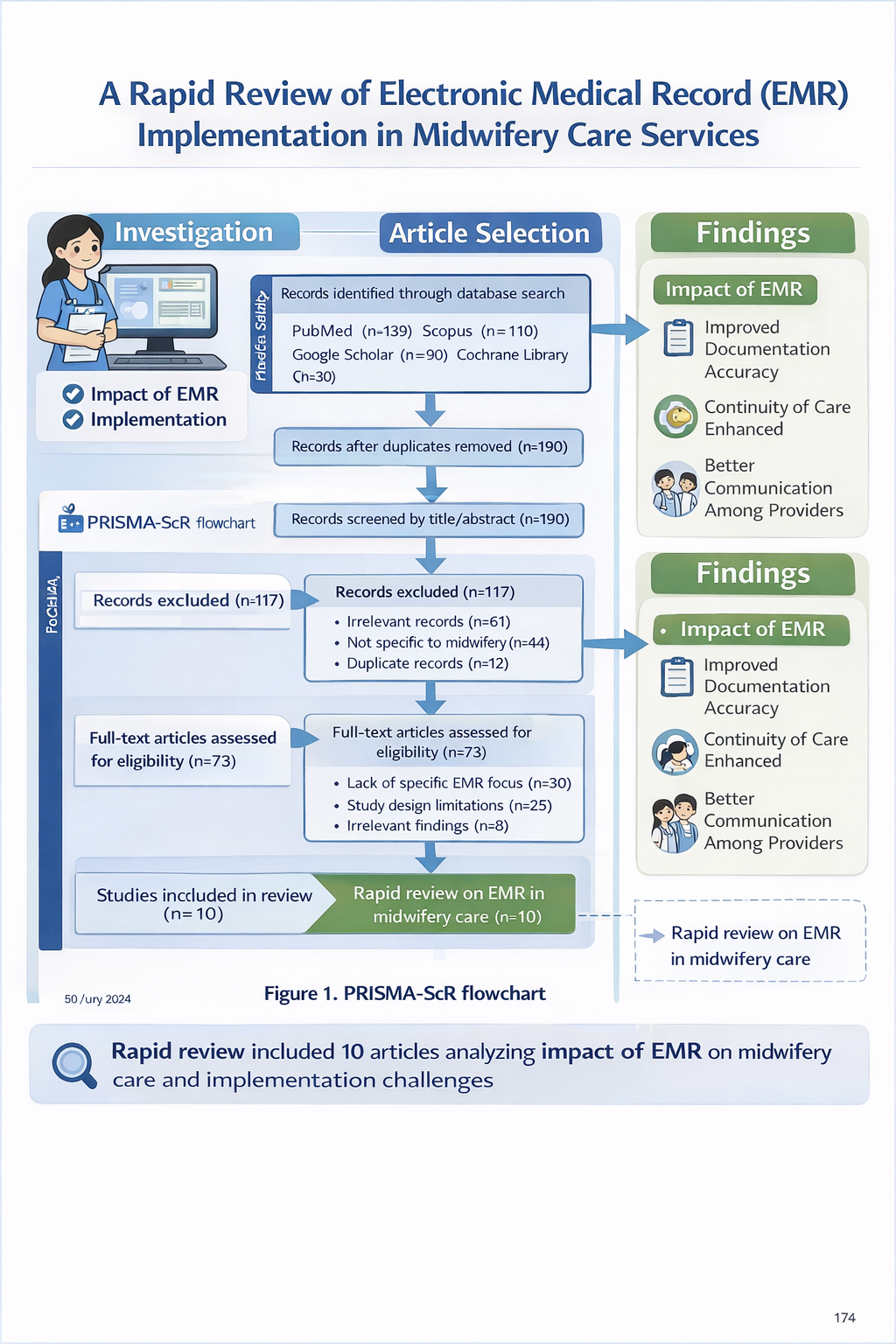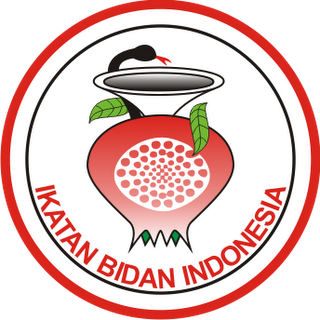A Rapid Review of Electronic Medical Record (EMR) Implementation in Midwifery Care Services
https://doi.org/10.33860/jbc.v7i2.3866
Keywords:
Implementation, Electronic Medical Record (EMR), Midwifery Care, Midwifery Practice, MidwifeAbstract
Background: one of the common problems associated with breastfeeding and exclusive breastfeeding is breast swelling until the incidence rate reaches 20%-70% in nursing mothers. Swelling of the breasts can be prevented non-pharmacologically, namely by compressing cold cabbage leaves and the marmet technique. Purpose: The study aimed to compare the effectiveness of cold cabbage leaf compresses and the Marmet technique in preventing postpartum breast swelling in normal puerperal mothers. Methods: Types of pre-experimental research with One-shot case study design namely cabbage compress (duration 30 minutes) and marmet technique given 1 time. The total sample of 30 respondents, was divided by 15 respondents in each group and sampling by non-probability sampling type of consecutive sampling. The measuring instrument uses an observation sheet containing a six-point engorgement scale (SPES). Data was analyzed using the Wilcoxon and Mann-Whitney test (p<0,05). Results: analysis of the effect of cold cabbage leaf compress management and marmet technique on the prevention of breast swelling for normal puerperal mothers was obtained in cold cabbage leaf compresses p-value of 0.014 and in the marmet technique obtained p-value 0.317. The results of the analysis of the effectiveness of the two techniques were obtained with a p-value of 0.007 or <0.05. Conclusion: Cold cabbage leaf compresses were significantly more effective in reducing breast swelling compared to the Marmet technique in the Independent Practice of Midwives (PBM) Setia of Palu City. It is recommended to use both techniques in helping to prevent breast swelling for normal puerperal mothers.
Downloads
References
Abdel-Hafez, A., Baker, D., Winning, M., & Scanlon, A. (2021). The Clinical Nursing and Midwifery Dashboard (CNMD): A State-Wide Implementation. Studies in Health Technology and Informatics, 284, 20–24. https://doi.org/10.3233/SHTI210654
Abdulai, A. F., & Adam, F. (2020). Health providers’ readiness for electronic health records adoption: A cross-sectional study of two hospitals in northern Ghana. PLoS ONE, 15(6), 1–11. https://doi.org/10.1371/journal.pone.0231569
Abore, K. W., Debiso, A. T., Birhanu, B. E., Bua, B. Z., & Negeri, K. G. (2022). Health professionals’ readiness to implement electronic medical recording system and associated factors in public general hospitals of Sidama region, Ethiopia. PLoS ONE, 17(10 October), 1–12. https://doi.org/10.1371/journal.pone.0276371
Al-Jundi, A., & Sakka, S. (2017). Critical appraisal of clinical research. Journal of Clinical and Diagnostic Research, 11(5), JE01–JE05. https://doi.org/10.7860/JCDR/2017/26047.9942
Alexiuk, M., Elgubtan, H., & Tangri, N. (2024). Clinical Decision Support Tools in the Electronic Medical Record. Kidney International Reports, 9(1), 29–38. https://doi.org/10.1016/j.ekir.2023.10.019
Amin, M., Setyonugroho, W., & Hidayah, N. (2021). Implementasi Rekam Medik Elektronik: Sebuah Studi Kualitatif. JATISI (Jurnal Teknik Informatika Dan Sistem Informasi), 8(1), 430–442. https://doi.org/10.35957/jatisi.v8i1.557
Ankit Singh, Sammita Jadhav, R. M. R. (2020). Factors to Overcoming Barriers Affecting Electronic Medical Record Usage by Physicians. Indian Journal of Community Medicine, 45(2), 168–171. https://doi.org/10.4103/ijcm.IJCM
Ariani, S. (2023). Analisis Keberhasilan Implementasi Rekam Medis Elektronik Dalam Meningkatkan Efisiensi Dan Mutu Pelayanan. Jurnal Kesehatan Dan Kedokteran, 2(2), 7–14. https://doi.org/10.56127/jukeke.v2i2.720
Aripa Lusyana, A. W. P. (2020). Penerapan Sistem Informasi Kesehatan Berbasis Komputer di Puskesmas Jongaya Kota Makassar. Promotif Preventif, 2(1), 19–26.
Ayaad, A. O., Alloubani, A., & Abu, E. (2019). The role of electronic medical records in improving the quality of health care services: Comparative study. International Journal of Medical Informatics, 127, 63–67. Retrieved from https://doi.org/10.1016/j.ijmedinf.2019.04.014
BPK, R. (2022). Peraturan Menteri Kesehatan Republik Indonesia Nomor 18 Tahun 2022 Tentang Penyelenggaraan Satu Data Bidang Kesehatan Melalui Sistem Informasi Kesehatan. In Journal of Economic Perspectives (Vol. 2). Retrieved from http://www.ifpri.org/themes/gssp/gssp.htm%0Ahttp://files/171/Cardon - 2008 - Coaching d’équipe.pdf%0Ahttp://journal.um-surabaya.ac.id/index.php/JKM/article/view/2203%0Ahttp://mpoc.org.my/malaysian-palm-oil-industry/%0Ahttps://doi.org/10.1080/23322039.2017
Craswell, A., Kearney, L., McAtee, J., Hadland, M., Smyth, W., & Nagel, C. (2021). Impact of Electronic Medical Records within the Maternity Environment: An Ethnographic Exploration of Midwifery Practice. Studies in Health Technology and Informatics, 284, 528–530. https://doi.org/10.3233/SHTI210788
Delfina Darianti, Vina Ervina Destiana Dewi, & Leni Herfiyanti. (2021). Implementasi Digitalisasi Rekam Medis Dalam Menunjang Pelaksanaan Electronic Medical Record Rs Cicendo. Jurnal Ilmiah Manusia Dan Kesehatan, 4(3), 403–411. https://doi.org/10.31850/makes.v4i3.975
Eriantika, I. (2022). Hambatan Dan Manfaat Penerapan Rekam Medis Elektronik Di Rumah sakit. Rme, 24(44), 1–23.
Helou, S., Abou-Khalil, V., Yamamoto, G., Kondoh, E., Tamura, H., Hiragi, S., … Kuroda, T. (2019). Understanding the EMR-related experiences of pregnant Japanese women to redesign antenatal care EMR systems. Informatics, 6(2), 1–22. https://doi.org/10.3390/informatics6020015
Jedwab, R. M., Franco, M., Owen, D., Ingram, A., Redley, B., & Dobroff, N. (2022). Improving the Quality of Electronic Medical Record Documentation: Development of a Compliance and Quality Program. Applied Clinical Informatics, 13(4), 836–844. https://doi.org/10.1055/s-0042-1756369
Julia Pohan, H. D., Sulisna, A., & Meliala, S. A. (2022). Faktor Penghambat Belum Diterapkannya Rekam Medis Elektronik (Rme) Di Klinik Aksara Tahun 2022. Indonesian Trust Health Journal, 5(1), 45–50. https://doi.org/10.37104/ithj.v5i1.98
Kearney, L., Craswell, A., Cole, R., Hadland, M., Smyth, W., & Nagle, C. (2023). Woman-centred care and integrated electronic medical records within Australian maternity settings: Point prevalence audit and observational study. Midwifery, 123, 103718. https://doi.org/10.1016/j.midw.2023.103718
Kemenkes, R. (2022). CETAK BIRU STRATEGI TRANSFORMASI DIGTIAL KESEHATAN 2024. Retrieved from https://repository.kemkes.go.id/book/710
Kiberu, V. M., Scott, R. E., & Mars, M. (2019). Assessing core, e-learning, clinical and technology readiness to integrate telemedicine at public health facilities in Uganda: A health facility - Based survey. BMC Health Services Research, 19(1), 1–11. https://doi.org/10.1186/s12913-019-4057-6
Kusumah, R. M. (2022). Analisa Perbandingan Antara Rekam Medis Elektronik dan Manual. COMSERVA Indonesian Jurnal of Community Services and Development, 1(9), 595–604. https://doi.org/10.59141/comserva.v1i9.67
Larasati, R., Novianto, W. T., & Purwadi, H. (2020). Antenatal Care (ANC) Medical Record as an Effort to Reduce Maternal and Infant Mortality Rates. Journal of Health and Medical Sciences, 3(1). https://doi.org/10.31014/aior.1994.03.01.107
Lipenguet, G. M., Ngoungou, E. B., Roberts, T., Ibinga, E., Amani Gnamien, P., Engohang-Ndong, J., & Wittwer, J. (2022). Evaluation of the intention to use the electronic medical record (EMR) by health professionals in healthcare facilities of Libreville and Owendo in Gabon. JAMIA Open, 5(4), 1–7. https://doi.org/10.1093/jamiaopen/ooac096
Lloyd, S., Long, K., Probst, Y., Di Donato, J., Oshni Alvandi, A., Roach, J., & Bain, C. (2023). Medical and nursing clinician perspectives on the usability of the hospital electronic medical record: A qualitative analysis. Health Information Management Journal, 0(0), 1–9. https://doi.org/10.1177/18333583231154624
Nha, Q., Pluye, P., Fàbregues, S., Bartlett, G., Boardman, F., Cargo, M., … Vedel, I. (2018). MIXED METHODS APPRAISAL TOOL ( MMAT ) VERSION 2018 User guide.
Ramoo, V., Kamaruddin, A., Nawawi, W. N. F. W., Che, C. C., & Kavitha, R. (2023). Nurses’ Perception and Satisfaction Toward Electronic Medical Record System. Florence Nightingale Journal of Nursing, 31(1), 2–10. https://doi.org/10.5152/FNJN.2022.22061
Rasmi, M., Alazzam, M. B., Alsmadi, M. K., Almarashdeh, I. A., Alkhasawneh, R. A., & Alsmadi, S. (2020). Healthcare professionals’ acceptance Electronic Health Records system: Critical literature review (Jordan case study). International Journal of Healthcare Management, 13(S1), 48–60. https://doi.org/10.1080/20479700.2017.1420609
Salleh, M. I. M., Abdullah, R., & Zakaria, N. (2021). Evaluating the effects of electronic health records system adoption on the performance of Malaysian health care providers. BMC Medical Informatics and Decision Making, 21(1), 1–13. https://doi.org/10.1186/s12911-021-01447-4
Setyadi, D., & Nadjib, M. (2023). The Effect of Electronic Medical Records on Service Quality and Patient Satisfaction: A Literature Review. Journal Research of Social Science, Economics, and Management, 2(12), 2780–2791. https://doi.org/10.59141/jrssem.v2i12.500
Sudirahayu, I., & Harjoko, A. (2017). Analisis Kesiapan Penerapan Rekam Medis Elektronik Menggunakan DOQ-IT di RSUD Dr. H. Abdul Moeloek Lampung. Journal of Information Systems for Public Health, 1(3). https://doi.org/10.22146/jisph.6536
Tania, A., Putri, D., Kesehatan, M. P., Administrasi, D., Kesehatan, K., Ilmu, F., … Indonesia, U. (2023). Challenges in implementing electronic medical record in Indonesia healthcare facilities. Jurnal Medika Hutama, 4(3), 3427–3431.
Tricco, A. C., Langlois, E. V, & Straus, S. E. (2017). Rapid Reviews to Strengthen Health Policy and Systems: A Practical Guide. In World Health Organisation. Retrieved from https://apps.who.int/iris/bitstream/handle/10665/258698/9789241512763-eng.pdf;jsessionid=513527B4C7164372E19553D6E2C6EABA?sequence=1
Tubaishat, A. (2018). Perceived usefulness and perceived ease of use of electronic health records among nurses: Application of Technology Acceptance Model. Informatics for Health and Social Care, 43(4), 379–389. https://doi.org/10.1080/17538157.2017.1363761
Venkateswaran, M., Ghanem, B., Abbas, E., Khader, K. A., Ward, I. A., Awwad, T., … Frøen, J. F. (2022). A digital health registry with clinical decision support for improving quality of antenatal care in Palestine (eRegQual): a pragmatic, cluster-randomised, controlled, superiority trial. The Lancet Digital Health, 4(2), e126–e136. https://doi.org/10.1016/S2589-7500(21)00269-7
Wahyuningsih Nugraheni, S. (2017). Evaluasi Sistem Informasi Rekam Medis di RSUD Kota Surakarta dalam Mendukung Rekam Kesehatan Elektronik. Indonesian Journal On Medical Science, 4(1), 1313–2355. Retrieved from http://ejournal.poltekkesbhaktimulia.ac.id/index.php/ijms/article/view/96
Wynter, K., Holton, S., Nguyen, L., Sinnott, H., Wickramasinghe, N., Crowe, S., & Rasmussen, B. (2022). Nurses’ and midwives’ experiences of the first phase of the implementation of an electronic medical records system. Australian Health Review, 46(2), 188–196

Downloads
Published
How to Cite
Issue
Section
License
Copyright (c) 2025 Kriska Afri Juliandari, Septiana Ade Ammalia, Dewi Anggraini Padmaningtyas, Rohani, Cesa Septiana Pratiwi (Author)

This work is licensed under a Creative Commons Attribution-ShareAlike 4.0 International License.
Authors who publish with Jurnal Bidan Cerdas agree to the following terms:
- Authors retain copyright and grant the journal right of first publication with the work simultaneously licensed under a Creative Commons Attribution License (CC BY-SA 4.0) that allows others to share the work with an acknowledgment of the work's authorship and initial publication in this journal.
- Authors are able to enter into separate, additional contractual arrangements for the non-exclusive distribution of the journal's published version of the work (e.g., post it to an institutional repository or publish it in a book), with an acknowledgment of its initial publication in this journal.
- Authors are permitted and encouraged to post their work online (e.g., in institutional repositories or on their website) prior to and during the submission process, as it can lead to productive exchanges, as well as earlier and greater citation of published work.

This work is licensed under a Creative Commons Attribution-Share Alike 4.0 International License
You are free to:
- Share, copy and redistribute the material in any medium or format
- Adapt, remix, transform, and build upon the material for any purpose, even commercially.
- The licensor cannot revoke these freedoms as long as you follow the license terms.




